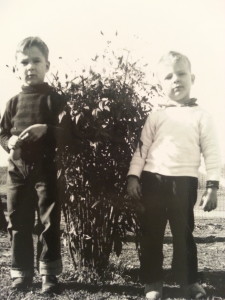Had I known that my dirt bike could well have landed at the bottom of a river before day’s end, I might have stayed in bed.
Rains had been falling off and on for several days around Suna Mission, punctuated from time to time with pummeling downpours. My piki-piki slipped and slithered beneath me for miles along the muddy roadway, finally bringing me to a bridge. Submerged beneath a torrent of waters.
It was the bridge I had planned to cross on the road taking me to Lake Victoria’s shoreline ten miles further on. I was slated to preach the Sunday service in a fishing village.
Great volumes of murky brown raced along – a steady, turbulent surge – passing both under and above the concrete bridge. Slowing the bike to a halt I let my feet find the muddy road surface. I sat some moments just taking in the scene. A young Luo man approached as I dismounted.
Smiling cheerily, he wasted no time offering me a proposition once the customary greetings were out of the way.
“Would you like to go over to the other side?” He hardly took a breath before adding, “I can get you there. . .” The youth quickly surveyed the Suzuki and waved an open palm toward it before concluding, “and you’re piki-piki, too!”
Shy of any strong conviction to leap at his offer, I questioned what he had in mind.
“Come. Just come.”
I clambered behind him up a muddy hill, a rise from which we could now take in more of the river upstream. I wasn’t quite ready for the view.
There at the water’s edge lay a home-built canoe – long and narrow. It had been wrestled to shore and held in place by it’s two captains. First into the into the canoe was lifted a hefty bag of maize, probably a good 70 pounds worth. What most caught my eye, though, was an animal being drawn, much against its will, down the steep bank to the water, and the canoe.
“Kuja! Kuja! (Come! Come!)”, shouted the man leveraging the donkey’s makeshift harness, as his comrade energetically shoved from the animal’s backside. The poor creature’s resistance proved futile as it skidded nearer and nearer its watery destination.
The donkey’s handler passed the harness rope to the nearest boats-man who made sure the animal went into the water alongside the vessel rather than into it.
Once the craft was loaded, off they rowed, the donkey swimming nervously alongside – it’s jaw held taut by the keeper now on-board – bumping now and then against the canoe side.
Whatever was true about the action-laced drama, the mariner’s labors convinced me. To – reluctantly at least – entrust my old dirt bike to them. With one condition, however.
“Not a single scratch must be added to the bike until it’s safely across and sitting on the opposite bank.”
If this feat were met satisfactorily I would add an extra two Kenya shillings on the agreed fare. Naturally, I wasn’t so concerned about added dings on the already-scarred machine. I simply wished to make the strong point that neither the Suzuki nor myself landed at the bottom of the river.
Two additional canoes – freed of goods they’d just delivered to the far bank – made their way to our shore. The boats found me struggling some to keep my balance on the steep, sloshy terrain.
Twenty minutes later and a good way further downstream, both my piki-piki and me alighted intact on the opposite shore. Balancing in the canoe carrying me across, I had snapped a picture of the bike, it’s 250 cc frame held perfectly upright the whole distance in the second boat by two strapping Luo youth. The photo appeared later in our newsletter update with a caption beneath advising,
“Watch and Pray”.
©2018 Jerry Lout


